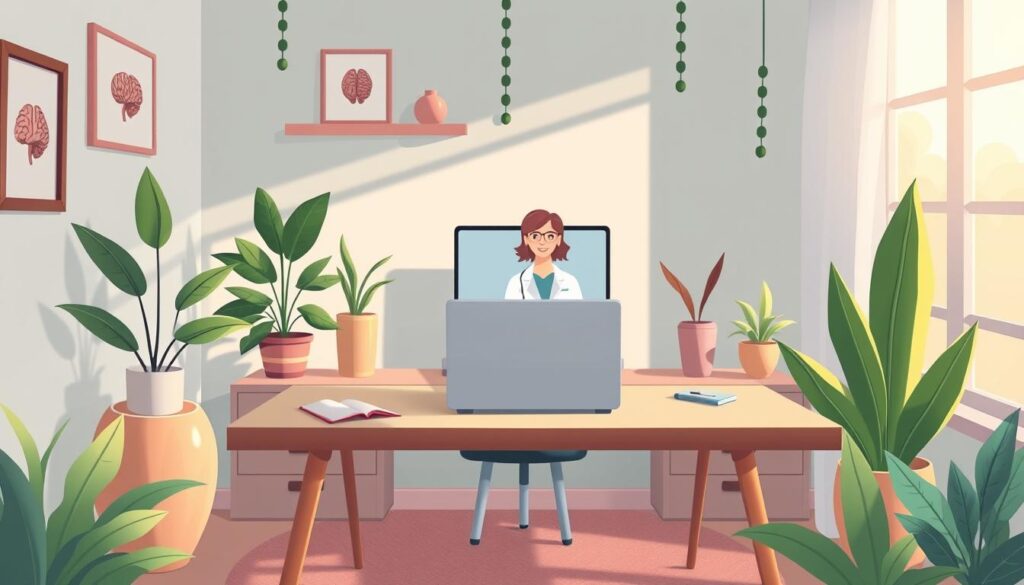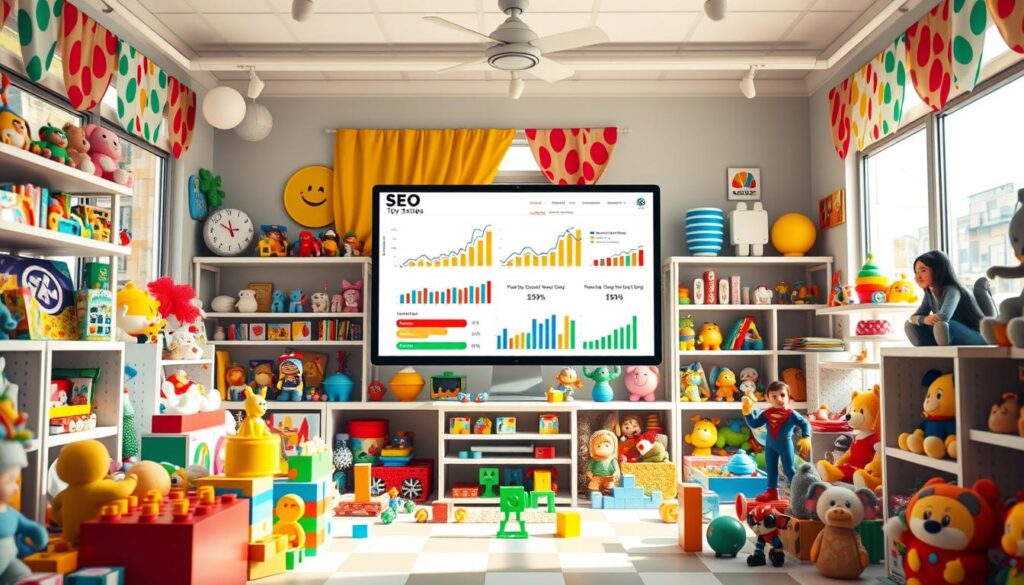How can a simple marketing strategy change how mental health counselors meet clients? Many professionals didn’t learn about marketing in school. But, knowing how to market is key to a successful practice. Today, online marketing is crucial for finding the right clients and avoiding slow periods.
Marketing is like a light that guides people to the help they need. A good plan boosts visibility and builds real connections. With a little time each week and a professional online presence, even small budgets can make a big difference.
Many think big budgets are needed for success. But, small practices can see big changes with the right marketing. With over 55.8 million adults in the U.S. seeking mental health services, now is the time for counselors to use effective marketing. For more on how to reach the right audience, check out SEO for mental health professionals.
Key Takeaways
- Marketing is critical for attracting and retaining clients in mental health counseling.
- Consistent marketing efforts can help minimize seasonal impacts on practice growth.
- All sizes of practices can benefit from effective marketing strategies.
- Professional branding, including headshots, enhances trust with potential clients.
- Identifying an ideal client can lead to more successful marketing outcomes.
Understanding the Importance of Marketing in Mental Health Counseling
As more people seek counseling, marketing becomes key for counselors. Over 55 million Americans face mental health issues, but half don’t get help. This is a big chance for counselors to grow their practices with the right marketing.
Getting to potential clients is not just about being qualified. It’s about using marketing to be seen and trusted.
The Growing Need for Counseling Services
There’s a big need for mental health services. Thousands look for treatment every year. Therapists who market well can help fill this gap.
Mental health marketing helps people find help sooner. This leads to better results for clients and a stronger practice for counselors.
Building Trust and Rapport Online
In today’s world, building trust online is crucial for counselors. How counselors present themselves online can sway a client’s choice. It’s important to keep online interactions professional and show expertise.
This careful approach can build credibility and lasting client relationships. It shows the value of promoting mental health services.
Attracting the Right Clients
Attracting the right clients means using marketing that targets specific groups. Using content that speaks to certain demographics and improving online visibility are important. This helps counselors reach those who need their help the most.
By focusing marketing efforts, counselors can create a supportive environment. This not only grows their client base but also helps their practice thrive.
Identifying Your Target Audience for Effective Marketing
Finding out who your potential clients are is key to successful marketing in mental health counseling. Knowing who they are helps you create marketing that speaks to them. People have different backgrounds and interests that shape their needs and likes.
Demographics and Psychographics
Demographics include age, gender, where you live, how much you make, and your education. These details help define your client group. Psychographics look at mental health issues like anxiety and depression. This way, counselors can tailor messages to meet specific needs, whether it’s for one-on-one, couples, or group therapy.
Tailoring Messages for Specific Groups
It’s important to know how people like to communicate. Some prefer online chats, while others like face-to-face meetings or traditional ads. By making detailed profiles of your clients, you can tailor your marketing. This means using different types of content like blogs, videos, and infographics to reach more people.
Utilizing Online Surveys and Feedback
Online surveys help you understand what your clients need and what’s trending in the market. Getting feedback lets you keep improving your marketing. Using social media and email can also give you valuable insights. Tracking website visits and search terms helps you better serve your audience. For more tips on boosting your practice’s engagement, check out Revenue Boomers.
Developing a Strong Brand Identity as a Counselor
Creating a strong brand identity is key for counselors to stand out. It helps build trust and rapport with clients. This section will explore how to craft a professional branding strategy for therapists.
Creating a Professional Logo and Website
A professional logo is the first thing clients see. It’s crucial for making a good first impression. A simple yet memorable logo can greatly improve a therapist’s brand.
A user-friendly website is also important. It should show what makes you different and provide important service details. With more people looking for therapy online, having a strong online presence is essential.
Crafting Your Unique Value Proposition
Having a unique value proposition helps you stand out. It’s about what makes you different from others. Whether it’s art therapy or child counseling, highlighting these specialties can attract more clients.
A good branding strategy considers who your clients are and what they need. This can make your services more appealing.
Ensuring Consistent Messaging Across Platforms
Being consistent in your message is crucial. Inconsistencies can scare off potential clients. You need to make sure your online presence, including social media, reflects the same values and message.
Using social media to engage with clients can also strengthen your brand. It helps maintain a professional image.
| Brand Element | Importance |
|---|---|
| Logo | First impression; enhances memorability |
| Website | Main source of information; user-friendly design attracts clients |
| Unique Value Proposition | Defines what sets the therapist apart; attracts specific clientele |
| Messaging | Maintains cohesion; fosters trust among potential clients |
Building a strong brand identity is not just for counselors. It’s a part of personal branding. Keeping your branding up to date shows your commitment to your clients and your practice. For more on personal branding, check out this resource.
Leveraging Online Presence for Marketing
In today’s world, having a strong online presence is key for therapists. A good website is the base, offering easy access to service info and credentials. Using different platforms well helps you reach more people and connect deeply.
Importance of a User-Friendly Website
A website that’s easy to use is vital for mental health pros. It should be simple to navigate and hold visitors’ interest. Key features include:
- Mobile Compatibility: Make sure it works well on phones to reach more people.
- Clear Information: Provide all the details on services, methods, and privacy.
- Accessible Contact Details: Make it simple to find how to get in touch and schedule visits.
Utilizing Social Media Platforms
Social media is a great way for counselors to connect and build a community. Sites like Facebook, Instagram, and LinkedIn let therapists:
- Share Valuable Content: Post helpful tips, mental health advice, and success stories.
- Engage With Audiences: Host live Q&A sessions and reply to comments quickly to increase interaction.
- Create Targeted Ads: Advertise to people looking for mental health help with specific ads.
Developing a Blog or Resource Page
Starting a blog or resource page boosts a therapist’s online presence. It lets them share valuable content, showing their expertise and helping others. This can:
- Establish Authority: Show off their knowledge in certain areas and tackle common mental health issues.
- Boost SEO: Use the right keywords to make the website more visible online.
- Engage Clients: Get clients involved by asking for their thoughts and experiences.

| Strategy | Benefits |
|---|---|
| User-Friendly Website | Improves client experience, makes info easy to find, builds trust. |
| Social Media Marketing | Increases visibility, encourages community interaction, promotes services. |
| Blog Development | Shows expertise, boosts SEO, attracts more website visitors. |
Search Engine Optimization Strategies for Counselors
Search Engine Optimization (SEO) is key for mental health counselors online presence. It’s vital in a competitive field. Tailored SEO helps potential clients find your practice easily.
Keywords and Phrases to Target
Finding the right keywords is crucial. Tools like Google Keyword Planner help find relevant terms. Long-tail keywords, like “online couples counseling,” attract more clients.
For example, “female therapist near me” is searched 480 times monthly. This shows the importance of targeted keywords.
Local SEO Best Practices
Local SEO helps counselors show up in specific areas. Claim your Google My Business listing and keep your NAP (Name, Address, Phone Number) the same everywhere. Use terms like “Los Angeles online therapist” to rank better locally.
Creating local content and getting positive reviews boosts your visibility.
Content Marketing for Visibility
Combining SEO with content marketing is essential. Blog posts and articles make your site a trusted resource. Videos increase visibility on social media.
On-page and off-page SEO, like backlinks, improve rankings and engagement.
For more SEO tips for your mental health practice, check out Revenue Boomers.
The Role of Content Marketing in Counseling Services
Content marketing is key for mental health practices to shine online. Therapists create content that helps with mental health, teaches, and builds community. This approach boosts visibility and trust, making it vital for marketing.
Creating Useful Resources and Guides
Guides and resources make therapists seem like experts in mental health. Articles, blog posts, and downloads engage clients looking for help. This content tackles mental health topics and fights stigma, helping those hesitant to seek therapy.
Producing Video Content and Webinars
Video marketing is great for reaching people. Webinars and videos share knowledge through visuals. This way, therapists can share their skills widely, connecting with more clients.
Engaging with Your Audience Through E-newsletters
E-newsletters keep clients connected. They offer updates and support, helping beyond sessions. Email marketing shares articles, tips, and resources, building a community. This strategy grows practices by improving visibility and engagement, as shown in this insightful article.

Advertising and Promotion Tactics for Counselors
Marketing is key for counselors to draw in clients and stand out in a crowded field. A mix of ads can really help. By using various platforms, counselors can reach more people who need help.
Utilizing Google Ads and Social Media Ads
Google Ads and social media ads are great for therapists. They let counselors target specific groups. Ads that talk about common mental health issues can get more people to click.
Collaborating with Other Professionals
Working with doctors and other health experts can bring in referrals. Networking is vital for building trust. Workshops and joint projects boost visibility and build a caring community.
Attending Networking Events and Workshops
Networking events and workshops are great for counselors. They help build connections and promote services. These activities keep counselors up-to-date and build relationships that lead to referrals.
Choosing the Right Marketing Partner
Finding a good marketing partner is key for counselors wanting to stand out. Revenue Boomers is a top choice, helping mental health pros tackle today’s challenges. They help counselors create marketing plans that reach people looking for help and build trust.
This approach matches what consumers want. Most trust companies with good online reviews, like those on Google Business Profile.
Why Revenue Boomers Stands Out in the Industry
Revenue Boomers knows the mental health field well. They use data and strong marketing to get clients noticed online. This attracts the right people, leading to more clients and trust.
Benefits of Working with an SEO Agency
Working with an SEO agency is vital for lasting marketing success. They use strategies like PPC ads and social media to reach more people. This is especially true for those who need help right away.
69% of people like quick chatbot responses. Adding these to your strategy boosts user experience and sales. This partnership helps mental health counselors grow and succeed in a changing world.






